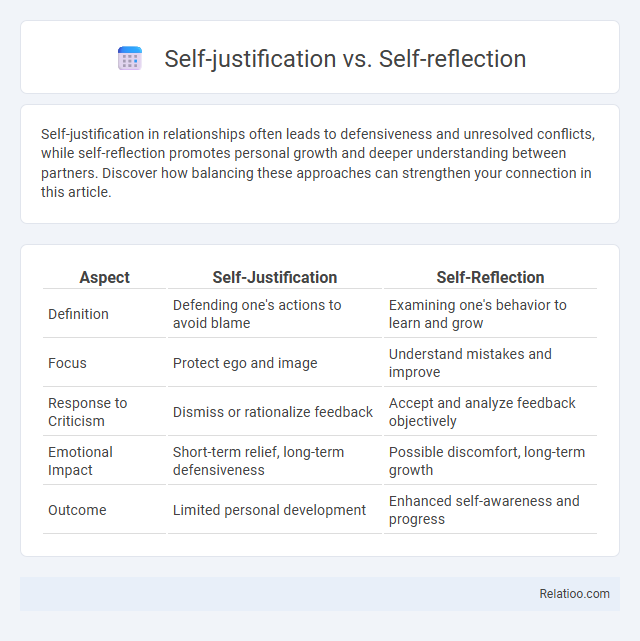Self-justification in relationships often leads to defensiveness and unresolved conflicts, while self-reflection promotes personal growth and deeper understanding between partners. Discover how balancing these approaches can strengthen your connection in this article.
Table of Comparison
| Aspect | Self-Justification | Self-Reflection |
|---|---|---|
| Definition | Defending one's actions to avoid blame | Examining one's behavior to learn and grow |
| Focus | Protect ego and image | Understand mistakes and improve |
| Response to Criticism | Dismiss or rationalize feedback | Accept and analyze feedback objectively |
| Emotional Impact | Short-term relief, long-term defensiveness | Possible discomfort, long-term growth |
| Outcome | Limited personal development | Enhanced self-awareness and progress |
Understanding Self-Justification: Definition and Examples
Self-justification refers to the psychological process where individuals rationalize their actions or beliefs to reduce cognitive dissonance and maintain a positive self-image. Examples include blaming external factors for failures or overemphasizing the importance of one's decisions despite contradictory evidence. Understanding self-justification helps distinguish it from self-reflection, which involves honest evaluation and learning from mistakes without biased reasoning.
What is Self-Reflection? Key Concepts and Benefits
Self-reflection involves critically analyzing one's thoughts, actions, and motivations to gain deeper self-awareness and promote personal growth. This key psychological process helps individuals identify strengths, weaknesses, and areas for improvement, fostering emotional intelligence and better decision-making. Regular self-reflection enhances mental clarity, reduces cognitive biases, and supports adaptive behavior in complex social and professional environments.
Psychological Roots: Why We Justify Ourselves
Self-justification stems from cognitive dissonance, where individuals seek to align their actions with their beliefs to preserve self-esteem and reduce psychological discomfort. In contrast, self-reflection involves critical evaluation of one's thoughts and behaviors to foster personal growth and awareness. The psychological roots of self-justification reveal an innate defense mechanism that prioritizes ego protection over objective self-assessment, often leading to biased reasoning.
The Science Behind Self-Reflection
Self-reflection involves critically examining one's thoughts, emotions, and behaviors to foster personal growth and improve decision-making, supported by neuroscience showing activation in the prefrontal cortex involved in self-regulation and insight. Contrarily, self-justification activates defensive mechanisms to maintain self-esteem by rationalizing actions, often linked to cognitive dissonance theory as described by Festinger. Research highlights that while self-justification reinforces biases and impedes change, self-reflection promotes neuroplasticity and emotional resilience, facilitating adaptive behavior and learning.
Self-Justification vs Self-Reflection: Core Differences
Self-justification involves defending your actions or beliefs to protect your self-esteem, often leading to biased reasoning and resistance to change. Self-reflection is a mindful process of evaluating your thoughts and behaviors objectively, fostering personal growth and improved decision-making. Distinguishing between these is crucial, as self-reflection encourages learning from mistakes while self-justification can hinder your ability to accept constructive feedback.
How Self-Justification Shapes Decision-Making
Self-justification influences decision-making by compelling you to rationalize choices to maintain self-esteem and avoid cognitive dissonance, often leading to biased or flawed conclusions. Unlike self-reflection, which encourages honest, critical evaluation of actions and promotes personal growth, self-justification functions as a defense mechanism that preserves a positive self-image at the expense of objective assessment. This tendency can result in repeating mistakes and resistance to change, highlighting the importance of cultivating mindful self-reflection to improve decision quality.
The Role of Self-Reflection in Personal Growth
Self-reflection plays a crucial role in personal growth by fostering genuine self-awareness and critical thinking, unlike self-justification, which often leads to biased reasoning and resistance to change. Your ability to engage in honest self-reflection helps identify areas for improvement, cultivate emotional intelligence, and develop adaptive strategies for overcoming challenges. Emphasizing self-reflection encourages continuous learning and authentic personal development, setting it apart from the defensive mechanisms of self-justification.
Overcoming the Trap of Self-Justification
Overcoming the trap of self-justification involves shifting from rationalizing mistakes to engaging in honest self-reflection, which promotes personal growth and accountability. Self-reflection requires critical evaluation of one's actions and motives without defense mechanisms, fostering learning and adaptive change. Recognizing the cognitive biases that fuel self-justification can help individuals break free from this cycle and embrace constructive self-awareness.
Strategies to Cultivate Effective Self-Reflection
Effective self-reflection requires cultivating honesty and mindfulness to truly evaluate your thoughts and actions without bias, contrasting with self-justification that often aims to defend behavior. Strategies to enhance self-reflection include keeping a daily journal, practicing meditation to increase awareness, and seeking constructive feedback from trusted individuals. These approaches help you develop deeper insight, promote personal growth, and reduce the automatic need to rationalize mistakes.
Building a Balanced Mindset: Integrating Reflection Over Justification
Building a balanced mindset requires prioritizing self-reflection over self-justification, allowing you to objectively assess your actions and learn from mistakes. Self-justification often leads to cognitive biases that block growth, whereas reflective practices enhance emotional intelligence and decision-making. Integrating consistent self-reflection cultivates resilience and fosters continuous personal development by aligning your mindset with truth and accountability.

Infographic: Self-justification vs Self-reflection
 relatioo.com
relatioo.com